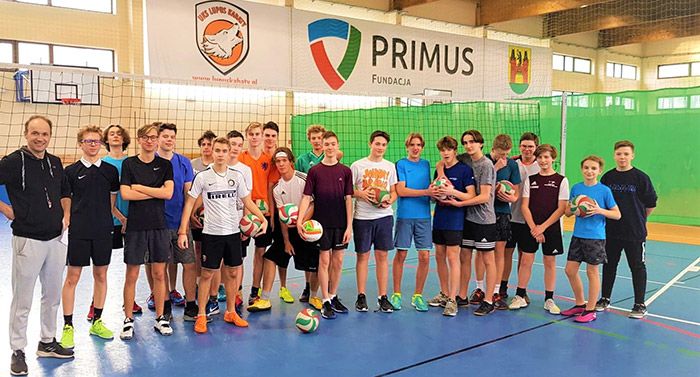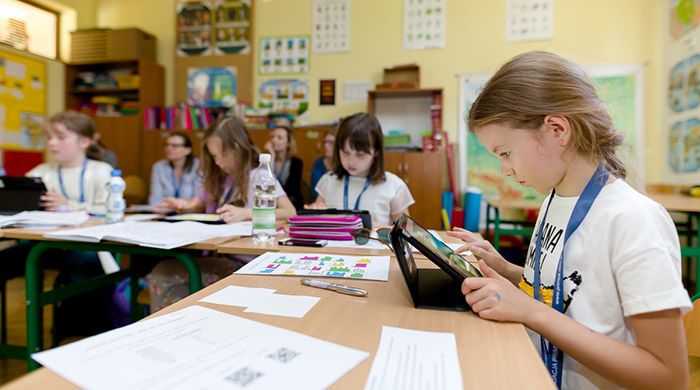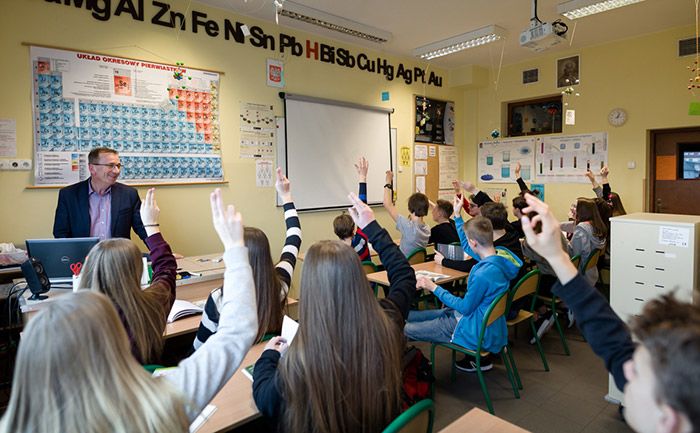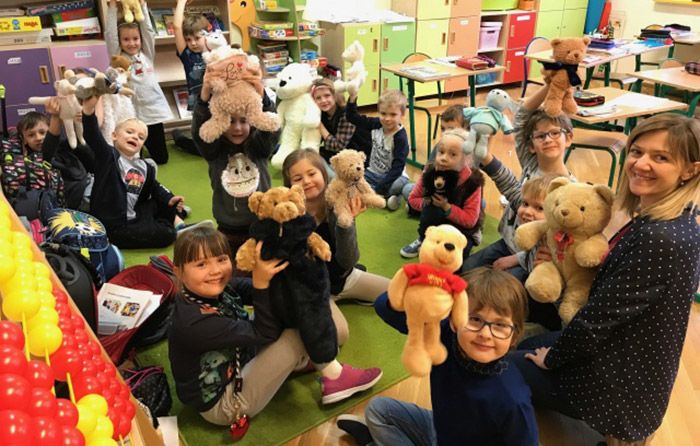On this page:
- History of the school
- The patron and character of the school
- The uniqueness of the school
- Curriculum
- Achievements
- PRIMUS and the pandemic

History of the school
Our Kids: What is the Primus Foundation?
Krzysztof Adamowicz: The Primus Foundation was established 27 years ago, when a group of parents from another school decided to create the school of their dreams. Primus is a non-profit foundation dealing exclusively with education. Our schools operate under the Primus Foundation. The main source of funds for the foundation is tuition fees, but there are also subsidies from the municipal government and various non-governmental grants. The foundation is made up of parents—the foundation's authorities, the council, are also parents only, the majority of parents, and some parents of former students. The core of the foundation's authorities is a 10-person board headed by the president.
The foundation's council is an advisory body, but it also gives opinions and approves every change, e.g., changes to the statute or the creation of new classes.
So parents play a very important role in our schools.
Our Kids: How were the schools established?
Krzysztof Adamowicz: First, we rented classrooms in a building belonging to the University of Warsaw in the Służew nad Dolinką district. After some time, the foundation was able to erect its own building. We were given a plot of land in Kabaty for our use. It’s next to the subway station—a great location. The new building was opened in 2000. At first, there were three schools in one building—a six-year primary school, a three-year middle school, and a high school, which was later closed.
I previously taught at a public primary school and got a job as a physics teacher at the Primus junior high school, which was just being created. In 2005, the principal of the middle school retired and I took over that role, to which I devoted myself entirely. In the meantime, a new phase of the school building was built with classrooms for the middle school and then a huge sports hall, two sports fields, and an auditorium, where various school ceremonies are now held. We have great sports facilities, WiFi throughout the building, and most of the rooms are air-conditioned, so students have excellent learning conditions. It is indeed a dream school.
Lidia Bodaszewska: In our building in Kabaty, we currently have excellent conditions for both schools—our high school and elementary school, and we are a large school. When I started working at Primus in 2000, there were two classes at one grade level and gradually, each year, the number grew to 3-4 classes at each grade level. It is undisputed proof that we are a school with a recognizable brand, highly appreciated in the primary school market.
In the 2020/2021 school year, we will have as many as 32 classes in our primary school, including two kindergarten groups, the so-called zerówka (Zero year). I would like to point out right away that we do not want—despite our great reputation—to grow in size and numbers, so we have made a decision to focus on quality and for three years we have had only three classes at one grade level.

As I mentioned before, we also have kindergarten groups in our primary school. We started with one, but the interest turned out to be so great that we created two. Children attending our kindergarten automatically go to Grade 1, together with their class teacher. As almost 100 percent of children after kindergarten continue their education in our Primus Grade 1, in the recruitment process we accept new children only to the third Grade 1 class.
In the school building, we have a separate section for our primary school, so kindergarten and early childhood education classes (grades up to 3) have their own space on the ground floor. On the same level, there are common rooms, from which there are two exits to our beautiful playground—accessible only to younger children. All students from both schools use the common infrastructure, i.e., sports fields, the sports hall, auditorium, cafeterias, etc.
Our Kids: But middle schools were closed as part of the education reform.
Krzysztof Adamowicz: Yes, which is hard for me to talk about calmly even now. Our middle school achieved fantastic results—a dozen or so students in one year were laureates of olympiads and subject competitions, our graduates were admitted to the best high schools. We started with two classes at one grade level. When I became principal, I introduced three, and then four. The last cohort before liquidation studied in five classes at one grade level.
Lidia Bodaszewska: As a result of the middle school closing, Grades 7 and 8 were included again in the primary school—four at each level. In the post-education reform era, we have already had two cohorts of Grade 8 graduates who completed primary school with excellent results and successfully continued their education in renowned high schools.
Our Kids: Now there is a PRIMUS high school again, of which you are the principal.
Krzysztof Adamowicz: The high school is our new child. When the decision was made to close middle schools, we immediately started creating a high school. This is not a continuation of the one that was closed 20 years earlier. We built everything from scratch thanks to invaluable help of our parents, the authorities, and my wonderful staff.
The patron and character of the school
Our Kids: Both schools are named after Robert Schuman, who is considered one of the fathers of the European Union. To what extent does this fact reflect the school's educational philosophy?
Krzysztof Adamowicz: The vision and mission of our school is to educate young Europeans open to the world, to various cultures, and to diversity.
At the beginning we created a special program of European education which consisted of blocks of subjects that started the tradition, continued to this day: trips to European Union countries. First, the program was called "Discover European Capitals," but then we changed the name to "Learn about European Countries," because the capital is not always the most interesting city in a given country.

This year, the planned trip did not take place, unfortunately. Throughout the year, we were preparing for a trip to Italy in June so that our students could learn about ancient culture. The project involved all students and was carried out during the history or Polish-language lessons. Its second part was supposed to be that trip, but unfortunately the pandemic thwarted our plans.
For many years, the Young European Club was active, and the club's activities were always crowned with our participation in the Schuman Parade. We invite guests and hold meetings with interesting people, and we maintain contact with the Schuman Foundation.
Lidia Bodaszewska: The subject of the EU is present not only in high school. We are a school educating citizens of the country and the world. We promote European education from Grade 1 and make sure that our children are educated in the European spirit. For two years, with great success and a very good response from parents and children, we have been implementing an innovative one-hour-a-week program entitled “European Education” at Primus. These are activities included in the curriculum, and children learn about the European Union in an age-appropriate, and more and more in-depth manner.
Primary school students together with high school students take part in the annual Schuman Parade on May 9. As for the trips abroad mentioned by Mr. Adamowicz, which are organized by teachers of second choice foreign languages for both schools (Spanish, German and French), students from our higher primary Grades—7 and 8 also take part in them. We work closely with our high school.
The uniqueness of the school
Our Kids: What distinguishes your school from others?
Krzysztof Adamowicz: In our school, the student is the subject, not the object of education. The school has a very friendly atmosphere, but with clearly defined boundaries. The teachers are very friendly, supportive, accepting various attitudes as long as they don't hurt someone else. We always give the student a chance to improve—if they've made a mistake, it does not mean they are doomed. We are definitely not a storage facility and we want students to be actively involved. We never say, "It's none of our business." We have a psychologist, pedagogue, and wonderful support staff.
Students’ harmonious and whole-person development is important to us—we care not only about the academics, but about each student’s developmental path, not one that we impose on them, but one that we create together with them. We really want them to notice that the world around them is very diverse and not everyone is healthy and wealthy, that there are people with problems around us. This is why for several years we have been supporting the Warsaw Children's Hospice (this is our “Primus Gift of the Heart”), the Great Orchestra of Christmas Charity (even a year ago our school hosted the Ursynów district final event of the Great Orchestra of Christmas Charity), campaigns such as Szlachetna Paczka (sending Christmas gift packs) or Chtistmas without Borders (Gwiazdka bez granic), where students with their guardian visited a refugee hostel and met many interesting people. We take care of an animal shelter with local stray cats. We organized aid for Australia during its horrible fires. To sum it up, we react actively to what life brings. In the fall, the kids collected winter shoes for the homeless, toys for children in hospitals, and books for the children’s hospice.
Lidia Bodaszewska: Our school is a place that educates and equips young people with the most important competencies to function in the society.
We implement content and language-integrated learning—CLIL and attractive, original curricula created by our own teachers: introduction to bilingualism and bilingualism in Grades 7-8. We promote iPads from Grade 1 as a tool supporting creative learning and we do not forget about the physical development of our students. We focus on mathematics education—this school year we are launching another innovation— "Mathematics in action or how to wake up a GIANT." We want our graduates to be able to use the great potential they gain in Primus in their adult life.

Of course, primary school students are involved in charity campaigns. As part of the campaign for Children's Hospice, in the pre-Christmas period, a three-day program is organized where various items made by children, parents, and teachers are sold and all money goes to a common piggy bank, which representatives of both schools personally deliver to the hospice.
We also organize visits of our Grade 7 and 8 students to seniors’ homes for the Polish Academy of Science retirees—they read together and walk with the residents in wheelchairs. Our students also take part in the Great Orchestra of Christmas Charity, fundraising with money boxes and actively participating in the campaign. As part of the Szlachetna Paczka campaign—our junior council (Grades 0-3) looks for a family that our Primus community will help. The collected gifts are usually enough for two to three families, so everyone is actively involved in the charity events.
Krzysztof Adamowicz: Our school has lively contacts with alumni who graduated years ago, and are now adults, often with academic degrees, who contact us and invite us to important life events.
We offer individual learning paths, e.g. for students who are proficient at some sports, and thanks to our school, have the opportunity to pursue an individual course of study.
We do not want it to be a school where money is the most important thing. We focus on what is available in the twenty-first century, offering our students the use of the latest technologies, which, by the way, paid off greatly during the pandemic.
Lidia Bodaszewska: Our school is friendly, safe, and modern. In a world that is developing at a dizzying pace, we focus on modern technologies. During the lessons, we use interactive boards, multi-books, and iPads. We use project and WebQuest methods that engage students and make learning a pleasure first of all. We are very pleased with the way we educate children to move freely in the world of technology.
In 2013, we introduced a pilot program called “Active Education with iPad,” which is now an integral part of teaching at our school. From the second half of the first year to the end of Grade 8, kids have iPads that make teaching more attractive and which support it. They are used for various projects and homework. We focus on information and communication technologies and skills in this field are a priority for us, also when we hire new teachers.
We have a modern and ecological building with classes of up to 16 students, and from Grade 7 up a maximum 18 students. We are proud of having the most beautiful sports hall in Ursynów, an outdoor playground and gym, well-equipped subject laboratories, and a common room with its own playground. The school has its own canteen with healthy and varied meals.
Curriculum
Our Kids: You teach in accordance with the Polish curriculum, but with various modifications. What are they?
Krzysztof Adamowicz: From Grade 7, bilingual classes are created. We transferred a lot of good middle school practices to high school. We do not create strictly profiled math-physics, biochemistry, or humanistic classes, but we provide direction. For the coming year, we are planning a science and a bilingual class. Extended English is compulsory for all students, regardless of class profile. Later, before the high school-leaving examination, students decide whether they choose to take an English exam at the bilingual or extended level.

In the science class there is a second principal subject—mathematics and one to two subjects such as physics, chemistry, or biology. So it is unique that students can try an individual learning path. For example, someone who chose extended chemistry, or physics, in Grade 1, might say that this is not what they are interested in and switch to biology. We allow that in Grade 1 and even in Grade 2. This policy is praised—our students can change their class profiles without having to change schools or classes.
The second thing that is highly appreciated is the fact that students learn a second language (French, Spanish, or German) by level, not by class, i.e., in one group there are students from different classes who are at the same level in the language they study.
In bilingual classes, they have English treated not just as a subject but as a tool. They all have classes with native speakers, but in a bilingual class, there is a separate native speaker teacher for speaking skills and a separate one for writing. Different subjects are taught bilingually in different years because it depends on the teachers; some teach their own subjects bilingually, e.g., knowledge about English-speaking countries or English-language literature.
Lidia Bodaszewska: As I mentioned before, when the middle school was closed, the primary school changed from a six-year school to an eight-year school. As a pilot, we decided to create one Grade 7 class as a bilingual one. From the 2020/2021 school year, every Grade 7 class will be bilingual, where teaching is conducted in two languages: Polish and a modern foreign language. In bilingual education, it is a modern foreign language that is a tool for acquiring knowledge and allows you to get to know a given subject from a different perspective. Subjects taught bilingually are mathematics, biology, physics, computer science, history, and social studies. Many teachers use some English in their other subject classes, such as physical education.
English is compulsory from Grade 0 to 8. In Grades 0-3, children have 4 hours of English plus 1 hour pre-school/early school education in English plus 1 hour with a native speaker. In Grades 4-6—4 hours of English plus 1 hour with a native speaker and in Grades 7 and 8, 5 hours of English plus 1 hour with a native speaker.
In our school, we offer integrated language- and subject-based teaching, called CLIL.
Other foreign languages, the so-called second-choice languages, i.e., German, Spanish and, French, are chosen by our students from Grade 4, not as in public schools from Grade 7, and are taught for three hours per week.
We are also proud that from Grade 4, our students have not four or five, but as many as six hours of Polish and math a week.
Our Kids: Has your high school produced any graduates yet?
Krzysztof Adamowicz: This year we had our first graduation year. It was a 17-person class, which started out as a class of 10 and then grew to 17. Our alumni also joined—after a year or two came back to us from other high schools. Now we have more classes at each grade level. At the level of the new second grades, we have three post-gymnasium classes and three grades after the eighth grade, i.e., six grades. The former are completely full, even though we've increased the maximum from 18 to 20, and there are still eager people waiting in line.
Achievements
Our Kids: What are you most proud of?
Krzysztof Adamowicz: Of all that I was talking about and the fact that our students are so connected with us even after they graduate and that I have students now who are my former students' children.
Lidia Bodaszewska: I am very proud that our students are able to think creatively and are curious to discover the world. This is because they feel the need to do so, not because they are forced to. We do everything in our power to help them fulfill their dreams and interests. I am proud of our pedagogical and technological innovations, which are at a very high level. In each classroom and subject lab we have an interactive board, projector, and students, as I mentioned, students also have iPads at their disposal.
I am very proud of the good command of English among our students who pass advanced language exams already in Grades 5 and 6. Currently, a Grade 6 student received 100% on a language exam for Grade 8 students. Our students pass the eighth-grade exams very well and go on to renowned high schools, e.g., in England. Our typical graduate is a student with highly developed communication skills at the level of functional bilingualism, i.e., the ability to use both Polish and English freely on a daily basis.
I have great teachers, highly motivated to work, who work in an atmosphere of cooperation, not competition. My teachers are people with passion, warmth, commitment, and positive energy. I appreciate them for their professionalism and individual approach to each child. In their work, they use the latest teaching methods and information and communication technologies, thanks to which learning in our school is never boring. To sum up, passion and professionalism are what make our Primus teaching staff unique!
PRIMUS and the pandemic
Our Kids: And how did you handle the pandemic?
Krzysztof Adamowicz: Great! We suddenly found ourselves in a situation no one had ever experienced before. March 11 was the last day of classes at school, and from March 12 we started moving our whole teaching online. On the first day, there were trials of various platforms, but on the next day, on Friday, we knew that we would be working on Teams because it proved to be the most successful, especially since all our students and teachers have Microsoft Office accounts. All lessons were held, including PE, tutorials, and consultations. Everything was going great. Paradoxically, it worked well for us—many parents decided to transfer their children during the pandemic to an unknown school with unknown friends who could only be seen on a computer.
Lidia Bodaszewska: In primary school, we also coped very well with distance learning, probably due to the fact that our priority is to focus on information and communication technologies. From March 12, the high school smoothly switched to remote teaching, and we did on March 16, sticking to almost 100% of the normal schedule. The younger classes had shortened lessons to keep the children's minds and eyes in good condition. Grades 4-8 followed an almost one-to-one program. When the students were tired, there were extra breaks, teachers asked the children to turn off the monitors and come back in 15 minutes.
Even PE was taught remotely. Not only did subject teachers work remotely—also after-school care teachers organized games online and at 7 p.m. they read to the students. It was a very popular program, I watched it many times myself. When in the second half of May it was time to decide whether to return to school (first preschool, then Grades 1-3) or whether we would continue learning remotely, the parents, in consultation with the school management, chose to continue remote education, because it had functioned so well.
Our Kids: What are your plans for the fall?
Krzysztof Adamowicz: This year, as an exception, we admitted students without entrance exams, but on the basis of their school certificates. Our plan for the fall is twofold, because no one knows what will happen. Perhaps the beginning of learning will be remote, but we plan to start the year in person, separately at each level; this is how we organized the end of the year for several classes at the same grade level. We hope for a quick return to normalcy, as there is no substitute for personal contact with peers and teachers.
Lidia Bodaszewska: We are thinking of personally welcoming the new students and parents of the kindergarten and the new Grade 1 classes, just like we organized the end of the year for Grade 8 students. For obvious reasons, they did not have the Grade 8 prom, but we did not want to say goodbye to them—after so many years spent at school—in front of the monitor. In the auditorium, every 1.5 hours, I met with each of the four Grades 8 classes. Each student could come with one adult, all were wearing masks and kept social distancing. It was an important farewell event for everyone, and I know that there were no such gatherings elsewhere. Parents, together with the students of each Grade 8 class, also planted a tree in the alumni alley—this is how a new tradition was created, which we want to continue every year.
It is possible that we will only welcome new students and parents in the auditorium, and the "old students" will meet their teachers in the classrooms, in compliance with all the regulations. We are preparing for in-person teaching, we are in the process of preparing special procedures in accordance with the guidelines of the Ministry of National Education, but we are also prepared for possible distance learning. We all dream of face-to-face contact with our students and teachers on a daily basis, and of returning to teaching in the school building, not in front of the screen.

People who read this also viewed:
- Private schools Warsaw
- Private day schools in Warsaw
- International schools in Warsaw
- Boarding schools in Warsaw
- Montessori schools in Warsaw
- Private high schools in Warsaw
- Private primary schools in Warsaw
- Preschools in Warsaw
- Non-public schools in Warsaw
- Private language schools in Warsaw
- Types of schools in Warsaw
- Private Catholic and Christian schools in Warsaw
- International Baccalaureate (IB) schools in Warsaw
- Warsaw preschool costs
- Private special needs schools in Warsaw
- Our Kids Interview: Get to know Thames British School
- Our Kids Interview: Get to know The English Playhouse and The English Primary
- Our Kids Interview: Get to know Polish British Academy of Warsaw
- Our Kids Interview: Get to know the Canadian School of Warsaw
- Our Kids Interview: Get to know The Primary and Secondary Schools of the Sisters of Nazareth in Warsaw
- Mokotow High School Campus - a new Warsaw high school and Thames British School campus
-
Advice Guide
- ABC of educational terminology: Glossary of terms and concepts
- The admissions process
- Advantages and disadvantages of studying in an international school
- The application process
- Benefits of Polish private schools
- Bilingual schools
- Boarding schools
- Choosing a private or nonpublic school in Poland
- Compare schools in Poland
- English schools in Warsaw
- Homeschooling
- International schools in Kraków
- International schools
- Private school interviews
- Music education
- Myths about private education
- Non-public schools in Poland
- School open houses
- Our Kids Interview: Get to know EF Academy Oxford
- Our Kids Interview: Get to know Open School
- Our Kids interview: Get to know Regent College International Schools
- Our Kids Interview: Get to know The American School of Warsaw
- Our Kids Interview: Get to know The British School Warsaw
- Our Kids Interview: Get to know Wrocław Cosmopolitan School (two interviews, new video)
- Poland school profiles
- Private day schools
- Gifted schools & programs
- Private Jewish schools in Poland
- Language schools
- Private school tuition and costs in Poland
- Private schools in Poland
- Private schools in Poland offering French-language immersion
- English immersion schools
- Poland school uniforms
- Private special needs schools in Warsaw
- Public versus non-public schools in Poland
- Private school questions
- Private school rankings
- Reasons for choosing private schools - Our Kids’s survey report
- Religious schools
- Schools and classes for children with ADHD in Poland
- Social primary schools
- Social Schools
- Special educational needs (SPE) certificates
- Special needs schools
- Study abroad at a private school
- The first annual non-public school fair in Poland
- The first annual Our Kids non-public school expo in Warsaw was a great success
- Third Private School Expo in Warsaw - summary
- Types of schools
- Types of schools in Warsaw
- Warsaw preschool costs
- Why private school?
- Why parents go private
-
Grades
- Boarding high schools
- Choosing a high school in Poland
- Mokotow High School Campus - a new Warsaw high school and Thames British School campus
- Montessori nursery schools
- Montessori preschools
- Our Kids Interview: Get to know English Montessori School Katowice
- Our Kids Interview: Get to know FSA School
- Our Kids Interview: Get to know KIDS & Co.
- Our Kids Interview: Get to know Polish British Academy of Warsaw
- Our Kids Interview: Get to know The English Playhouse and The English Primary
- Poland education: grade levels
- Preschools in Warsaw
- Private & non-public preschools
- Private & non-public primary schools
- Private bilingual elementary schools in Warsaw
- Private high schools
- Private high schools in Warsaw
- Private middle schools
- Nursery schools
- Private primary schools in Warsaw
- Social high schools
-
Locations
- Boarding schools in Warsaw
- English schools in Kraków
- International Baccalaureate (IB) schools in Warsaw
- International schools in Warsaw
- Montessori schools in Warsaw
- Non-public schools in Warsaw
- Our Kids Interview: Get to know EF Academy
- Our Kids interview: Get to know Excellence in Education better
- Our Kids Interview: Get to know PRIMUS Non-Public Primary School No. 47 and Non-Public Secondary School
- Our Kids Interview: Get to know the Canadian School of Warsaw
- Our Kids Interview: Get to know The Primary and Secondary Schools of the Sisters of Nazareth in Warsaw
- Private Catholic and Christian schools in Warsaw
- Private day schools in Warsaw
- Private language schools in Warsaw
- Private schools in Bialystok
- Bydgoszcz schools
- Częstochowa schools
- Private schools in Gdańsk & Gdynia
- Katowice schools
- Private schools in Krakow
- Lublin schools
- Olsztyn schools
- Private schools in Poznań
- Private schools in Rzeszów
- Szczecin schools
- Private schools Warsaw
- Private schools in Wrocław
- Zielona Góra schools
- Private schools in Łódź






 POL
POL CAN
CAN